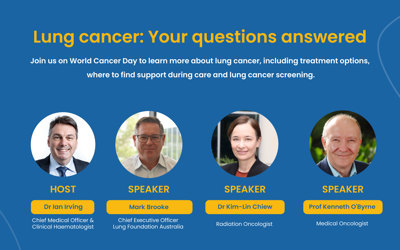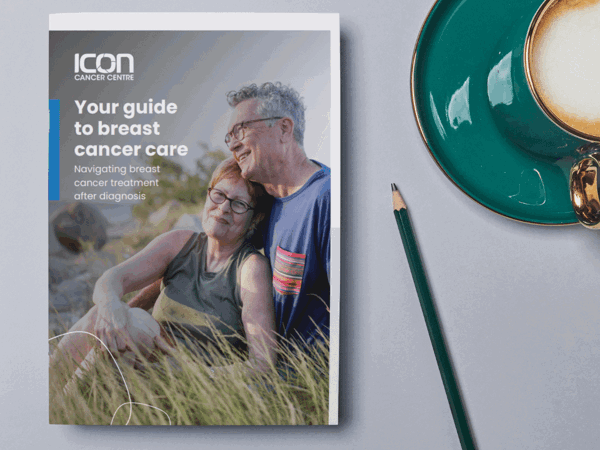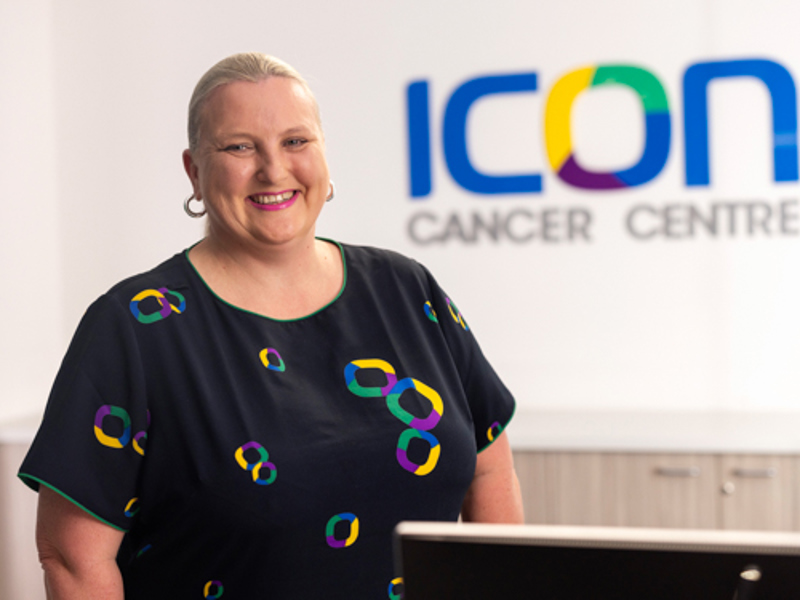
Icon Cancer Centre Facebook Live: Lung Cancer
The 43-year-old lost her older brother, Andy to the disease in 2015.
In July 2022, Sandy says it was her brother’s voice that urged her to book a mammogram.
“Leading up to my diagnosis, I was getting very tired. I was having to pull over on the way home from work to have a nap. I was also experiencing pain in my right breast and I couldn’t tolerate alcohol. I remember having a conversation with someone who had been diagnosed with cancer that an intolerance to alcohol was one of the first symptoms they experienced. I know it sounds a little odd, but I could also hear my brother’s voice saying, “look up, look up.” I ignored it for a while and finally one day I heard him screaming at me while I was driving and I looked up and there was a billboard encouraging women over the age of 40 to have a mammogram,” says Sandy.
Be informed, feel empowered. Our free guide will help you make decisions about your, or your loved ones, care.

Sandy went home and did a self-examination where she discovered a lump in her right breast. She booked a mammogram straight away. After a series of scans and tests, Sandy was diagnosed with stage 3 breast cancer, which had spread to her lymph nodes.
“To be honest, I wasn’t shocked because I heard my brother alerting me to it. I wasn’t feeling right in the weeks leading up to my diagnosis, so I had a bad feeling and I had prepared myself for the worst. It was still a struggle letting it sink in that I had cancer,” says Sandy.
Sandy underwent six months of chemotherapy. In March this year, she underwent a double mastectomy. In May, she commenced 25 sessions of radiation therapy at Icon Cancer Centre Gold Coast University Hospital under the care of radiation oncologist, Dr Preeti Bagga. She says finishing her treatment is June was a wonderful feeling.
I rang the bell loud and proud on my final day of treatment and I let a few expletives fly about cancer! Having cancer has taught me not to sweat the small stuff. I’ve lived a pretty healthy lifestyle but mentally, I now realise I have to be kinder to myself.
Throughout her treatment, Sandy spoke to the genetic health team at Gold Coast University Hospital about her family’s history with cancer.
“At the time of my brother’s passing, we didn’t know what type of cancer he had. He only told people about his cancer in the weeks leading up to his passing. He lived in a small country town in NSW and didn’t have access to a lot of healthcare services. He was a smoker, so we assumed he had lung cancer but that wasn’t the primary cause of his cancer. My grandmother passed away of breast cancer when she was about my age. And we recently found out that my cousin’s daughter, who is in her twenties, has breast cancer. The genetics team determined that the BRCA1 gene runs in our family and that my brother’s primary cancer was breast cancer,” says Sandy.
Sandy now wants to share a powerful message with other men and women: get yourself checked.
Many women I’ve spoken to are unaware that you can have a mammogram in your forties. Get yourself checked. Cancer can develop very quickly. If you leave it too long, it can mean the difference between having minimal treatment or having everything thrown at you. If my cancer was detected when it was stage 1 and not stage 3, my treatment wouldn’t have been as bad. You have to prioritise your health. If you don’t, you might not be here to worry about it. And it’s important to remember, breast cancer doesn’t discriminate. Women and men can get it, my family is a prime example. Learn about the symptoms and if you’re unsure, get yourself checked.
If you have a question about becoming a patient at one of centres or accessing our treatment services, we are here to help. We know that navigating a cancer diagnosis can be overwhelming, and can help you understand the process and what steps to take next.

Discover our comprehensive collection of content designed to inform, support, and guide you through every aspect of cancer care. From the latest news and updates to personal patient experiences and educational resources, these materials provide valuable insights to help you better understand cancer, treatment options, and the journey ahead.